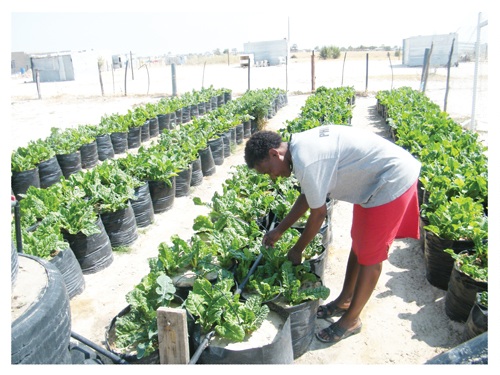
More veggies – less water

Meme Saara tending the micro-drip system at the Gospel Outreach Church in Ondangwa (Photograph by Hilma Hashange)
In 2009, Ondangwa-based NGO, Creative Entrepreneurs Solutions (CES) with funding from the UNDP GEF-SGP Community–based Adaptation to Climate Change Pilot Programme, introduced the Container Cultivation Micro-drip irrigation system, an initiative that allows individuals to grow their own vegetables in a very efficient way in otherwise degraded soil.
Creative Entrepreneurs also received funding from the Country Pilot Partnership Programme and the Namibia Africa Adaptation Project for their vegetable project.
Unlike the traditional way of growing vegetables by directly planting the seeds in the soil, the micro drip system uses black UV-resistant polyethylene bags where the soil is mixed with compost and manure for substrate improvement. A 240 litre tank provides water for the system. The whole system contains 200 bags, a 100 metre main pipe, drip pipes and drippers that irrigate directly to the plant roots on a continuous basis. According to Andreas Tweendeni, the Field Coordinator of Creative Entrepreneurs, most locals make use of flood water to fill up their tank. “Because the bags are not placed into the ground, they can be used almost anywhere. Also, the drippers only make use of the available water from the tank, thereby preventing over use of water,” he noted.
It takes at least 2 weeks for most seeds to germinate but some vegetables such as spinach, which is the most popular amongst the locals, can take only four days to germinate under micro-drip. The advantages of using the micro-drip system, according to Marie Johansson, CEO of Creative Entrepreneurs is that the soil is quickly improved, thereby proving a much easier way for seeds to germinate using only the right amount of water. Also, the bags used for the micro drip system are re-planted after every harvest. She says that the bags have a life span of up to 8 years and by continuously adding compost and manure a fertile and water-reticent soil is established in the bags. By adding mulching, evaporation is minimised.
The project grows vegetables for own consumption by the participant households while a small number is sold commercially. According to Johansson, a full harvest from a drip system is estimated to feed eight to ten people and at the same time, create a sizeable surplus to sell. Different vegetables are grown, such as carrots, spinach, cabbage, onions, tomatoes and even beetroot. More than 70 drip systems have so far been set up at households, local schools, churches, OVC organisations as well as community groups in the north central regions and in Kavango, and another 40 drip systems are in the pipeline. Training is offered to beneficiaries of the micro-drip systems in order for them to maintain the equipment and know how to grow and harvest their crops at the right time.
Besides providing the children with fresh vegetables to eat as part of their school feeding programmes, the micro-drip systems installed at schools also help the learners to experience first hand practical lessons on agriculture, soil improvement and water efficiency. One of the beneficiaries of the micro-drip system, the Gospel Outreach Church in Ondangwa, recently harvested 50 kg of spinach, of which they sold and earned N$325 which will be used to contribute to the church’s many social obligations.










































